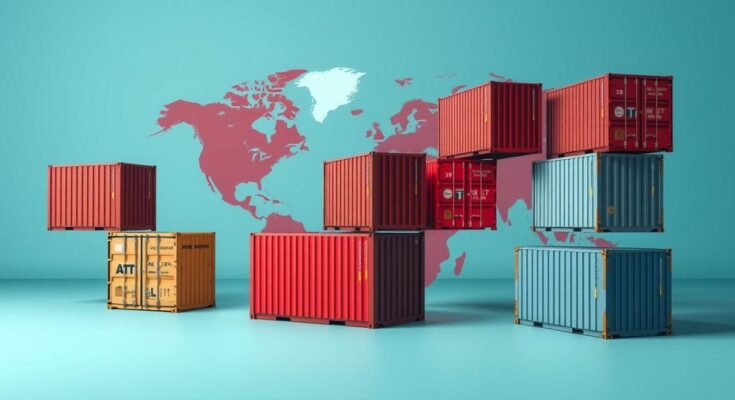President Trump’s tariffs on Canada, Mexico, and China have led to immediate threats of retaliation from these nations. Canada has announced significant counter-tariffs, while China and Mexico plan their responses, emphasizing the potential for harmful economic outcomes. The ongoing trade tensions highlight the necessity for dialogue to avert further conflict.
President Trump’s recent imposition of tariffs—25% on goods from Canada and Mexico and a 10% increase on certain U.S. exports to China—prompted immediate retaliatory measures from all three nations. Canada’s Prime Minister Justin Trudeau announced a counter-tariff strategy amounting to $30 billion, escalating to $155 billion worth of U.S. products. Trudeau emphasized the negative economic impacts these tariffs will incur, including increased prices for consumers and potential job losses.
In response, Ontario Premier Doug Ford proposed more severe countermeasures, including the possibility of halting shipments of vital resources like uranium and energy supplies, which could drastically affect the U.S. economy. Ford stated that retaliatory actions might involve reducing contracts with U.S. firms and stopping the import of American alcohol, stressing the need for a united provincial response.
China has also vowed to respond to the latest U.S. tariffs, with Foreign Ministry spokesperson Lin Jian criticizing Trump’s approach as misguided. He insisted that a dialogue based on equality and mutual respect is necessary to effectively address concerns regarding fentanyl. In retaliation, China implemented tariffs of 10-15% on U.S. agricultural products, targeting key exports.
Mexican President Claudia Sheinbaum expressed that retaliatory tariffs and additional measures would be announced soon, emphasizing that such actions are not intended to escalate economic conflict. She pointed out that the U.S. decision would adversely impact job creation and consumer prices, arguing the need for shared responsibility in addressing drug trafficking issues effectively.
Overall, escalating tariffs and countermeasures between the U.S., Canada, China, and Mexico risk damaging the economic partnership and create uncertainty in trade relations. Leaders stress the urgent need for dialogue and cooperative solutions to avoid further escalation, recognizing that both nations involved stand to suffer significant repercussions from a prolonged trade war.
The imposition of tariffs by the Trump administration has sparked swift and robust responses from Canada, China, and Mexico, indicating a looming trade war. Leaders from each country have voiced their resolve to retaliate, with measures that could severely disrupt economic relations. The rhetoric suggests an urgent need for dialogue to prevent further escalation that would adversely impact all parties involved.
Original Source: www.cbsnews.com




